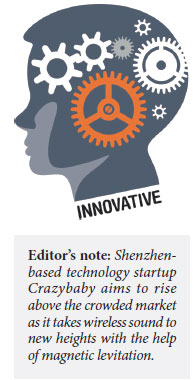UFO-powered bluetooth speaker that's out of this world
Updated: 2015-07-09 07:51
By Deng Yanzi in Shenzhen(HK Edition)
|
|||||||

While many techies may be busy observing the world around them for startup ideas, Allen Zhang Haixing sought inspiration from outer space.
And the other-worldly idea inspiring the 32-year-old Shanghai native is an automatic levitating bluetooth speaker, dubbed Mars.
Using magnetic levitation technology, Mars features a flying saucer-like disc that automatically rises from the cylindrical base of the subwoofer column and spins around, landing back quietly on the base when it is switched off.
Besides the unconventional look, unique features offered by Mars include automatic volume adjustment based on the distance between the user and the speaker. The base also serves as an auto-charging station for the disc when the battery runs low.
Priced from $189 to $249 each on the global crowdfunding platform Indiegogo, Mars became a crowdfunding success worth over $750,000 in 2014, literally in tune with its unique selling point - magnetic levitation.
Apart from its widely known application in high-speed trains, magnetic levitation technology is being increasingly applied in fields that may be less mammoth but no less exciting, including product displays, and now bluetooth speakers.
The use of levitation in Mars is more than just for a fun effect - it aims to deliver better sound quality by minimizing sound loss and distortion during transmission.
Zhang, founder and chief executive of Crazybaby, the company that created Mars, stressed that above all it is an audio product, rather than a toy. Mars ambitiously aspires to the best sound quality in the category of bluetooth speakers, with the unification of 360-degree sound projection from the floating UFO-like disc, and the subwoofer base.
"We are not innovating for the sake of innovation, but trying to solve problems in user experience," Zhang told China Daily.
But Mars is not the first levitating speaker to hit the market. In 2014, US-based Om Audio first applied the concept to speakers, before a few others quickly joined the bandwagon.
While the levitating speakers rely on a lift from magnetic force, their numerous and fast-moving competitors constantly seek out wow-factors with unconventional looks and specific design for outdoor use such as during biking or water activities, or even in the shower.
All are attempts to stand out in the ever more crowded and lucrative market for bluetooth speakers.
The global bluetooth speaker market, currently dominated by big names such as Bose, is expected to reach $7 billion by 2019, with projected annual growth rate at 38.73 percent, says a report from London-based technology market research firm Technavio .
The report also noted an uptick in research and development (R&D) innovations as a major trend in the bluetooth speaker market, along with demand for more sophisticated products from increasingly informed customers.
Mainland consumers are on-trend in showing greater interest in upscale bluetooth speakers, but the mainland market is currently crammed with middle- to low-end products, reports mainland-based Internet research center ZDC.
Products priced between 100 and 300 yuan ($16.1 to $48.3) account for more than half the number of bluetooth speakers available in the mainland market.
Zhang was emphatic in his observations on Huaqiangbei, the massive electronics market in Shenzhen, where some domestic speakers, which he described as flashy and poorly made, presented quite a contrast when displayed next to foreign brands.
That was the kind of discomfiting scene that inspired Zhang to create his own speaker.
In August 2014, Zhang began recruiting his team of seasoned acoustic engineers and industrial designers, set up Crazybaby and began R&D for Mars.
Like many tech startups, the R&D stage was hardly smooth sailing for Crazybaby. The team encountered a setback when incorporating the magnetic levitation technology into Mars, which eventually took them 20 weeks to complete and led to a four-month delay in the completion of the product.
However, this setback was far from overwhelming for Zhang, as his background in hardware industry had prepared him for such bumps in the road.
In 2004, Zhang came to Shenzhen to join the hardware design and manufacturing arm of a multinational electronics company. He quit three years later and started his first venture, a turnkey solution company that saw him design and produce electronic products, including Apple docking stations, for his clients.
So by the time Zhang came up with the idea for Mars, the then 31-year-old was already equipped with roughly a decade of experience in product design as well as entrepreneurship, and had an established supply chain at hand.
Deeply rooted in Shenzhen, Crazybaby is among a booming number of startups that benefit from the enormous manufacturing capacity of the Pearl River Delta region, but must at the same time confront and fight the city's copycat culture.
Notorious as it is, this culture is a reflection of the highly efficient and robust R&D and manufacturing sectors in Shenzhen, which neutralize the "copycat" concept - that is how Zhang interprets it.
Zhang hopes that the heavy investment of time and money in his core technology, soon to be patented, can shelter Crazybaby from copycats to some extent. But he admits that this may not be able to protect the company in the long term.
Copycats make impressively fast moves to produce similar or even better products. In response, innovation companies, including Crazybaby, would have no choice but to join the race to stay ahead.
"Small companies like us will have to act with new iterations faster to launch new products faster, and to occupy the mainland market faster," said Zhang.
iris@chinadailyhk.com

(HK Edition 07/09/2015 page8)